The Intel Kaby Lake-X i7 7740X and i5 7640X Review: The New Single-Threaded Champion, OC to 5GHz
by Ian Cutress on July 24, 2017 8:30 AM EST- Posted in
- CPUs
- Intel
- Kaby Lake
- X299
- Basin Falls
- Kaby Lake-X
- i7-7740X
- i5-7640X
Benchmarking Performance: CPU Encoding Tests
One of the interesting elements on modern processors is encoding performance. This includes encryption/decryption, as well as video transcoding from one video format to another. In the encrypt/decrypt scenario, this remains pertinent to on-the-fly encryption of sensitive data - a process by which more modern devices are leaning to for software security. Video transcoding as a tool to adjust the quality, file size and resolution of a video file has boomed in recent years, such as providing the optimum video for devices before consumption, or for game streamers who are wanting to upload the output from their video camera in real-time. As we move into live 3D video, this task will only get more strenuous, and it turns out that the performance of certain algorithms is a function of the input/output of the content.
All of our benchmark results can also be found in our benchmark engine, Bench.
7-Zip 9.2: link
One of the freeware compression tools that offers good scaling performance between processors is 7-Zip. It runs under an open-source licence, is fast, and easy to use tool for power users. We run the benchmark mode via the command line for four loops and take the output score.
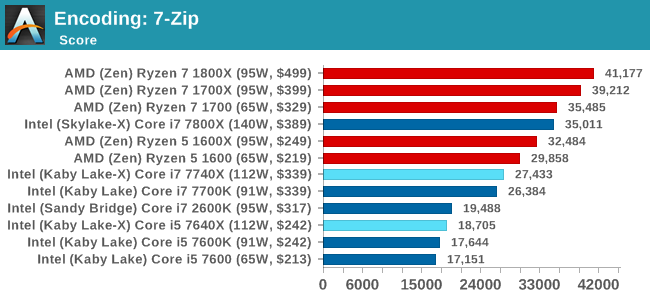
7z loves threads. 7z loves it.
WinRAR 5.40: link
For the 2017 test suite, we move to the latest version of WinRAR in our compression test. WinRAR in some quarters is more user-friendly that 7-Zip, hence its inclusion. Rather than use a benchmark mode as we did with 7-Zip, here we take a set of files representative of a generic stack (33 video files in 1.37 GB, 2834 smaller website files in 370 folders in 150 MB) of compressible and incompressible formats. The results shown are the time taken to encode the file. Due to DRAM caching, we run the test 10 times and take the average of the last five runs when the benchmark is in a steady state.
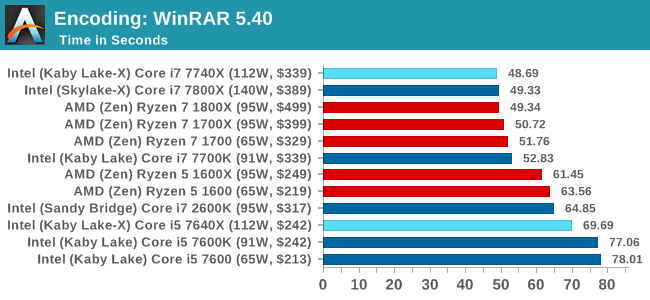
WinRAR is another benchmark like Agisoft, with some parts being serial and others multithreaded. When we compare the Core i7 to the Ryzen 7, the high ST performance helps push the Core i7 to the top despite the 2:1 thread deficit. On the other hand, the Core i5 has a 3:1 thread defecit to the Ryzen 5, and falls beneath it in the results.
AES Encoding
Algorithms using AES coding have spread far and wide as a ubiquitous tool for encryption. Again, this is another CPU limited test, and modern CPUs have special AES pathways to accelerate their performance. We often see scaling in both frequency and cores with this benchmark. We use the latest version of TrueCrypt and run its benchmark mode over 1GB of in-DRAM data. Results shown are the GB/s average of encryption and decryption.
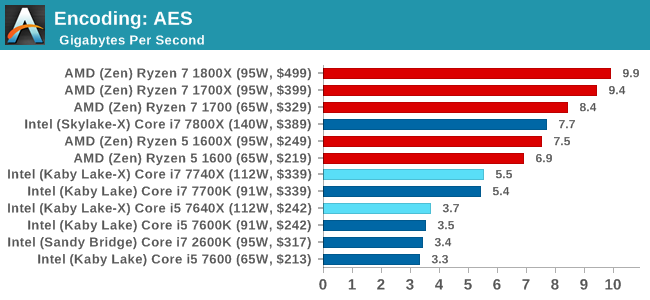
AES is an optimized problem for modern processors, so add frequency and cores to get a proportionally better result. Again, the Core i7-2600K and the Core i5-7640X are almost neck-and-neck.
HandBrake v1.0.2 H264 and HEVC: link
As mentioned above, video transcoding (both encode and decode) is a hot topic in performance metrics as more and more content is being created. First consideration is the standard in which the video is encoded, which can be lossless or lossy, trade performance for file-size, trade quality for file-size, or all of the above can increase encoding rates to help accelerate decoding rates. Alongside Google's favorite codec, VP9, there are two others that are taking hold: H264, the older codec, is practically everywhere and is designed to be optimized for 1080p video, and HEVC (or H265) that is aimed to provide the same quality as H264 but at a lower file-size (or better quality for the same size). HEVC is important as 4K is streamed over the air, meaning less bits need to be transferred for the same quality content.
Handbrake is a favored tool for transcoding, and so our test regime takes care of three areas.
Low Quality/Resolution H264: He we transcode a 640x266 H264 rip of a 2 hour film, and change the encoding from Main profile to High profile, using the very-fast preset.
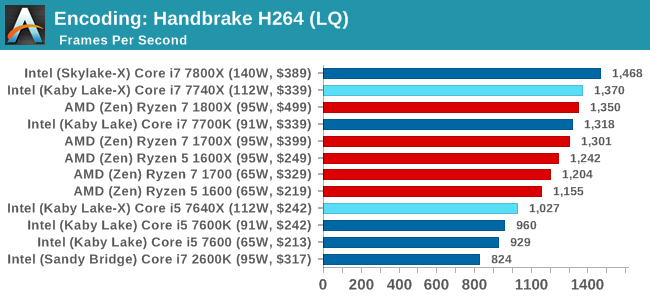
High Quality/Resolution H264: A similar test, but this time we take a ten-minute double 4K (3840x4320) file running at 60 Hz and transcode from Main to High, using the very-fast preset.
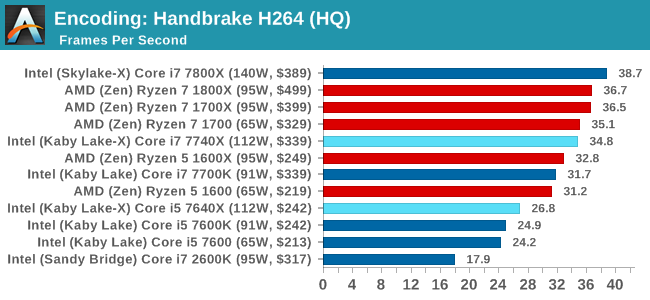
HEVC Test: Using the same video in HQ, we change the resolution and codec of the original video from 4K60 in H264 into 4K60 HEVC.
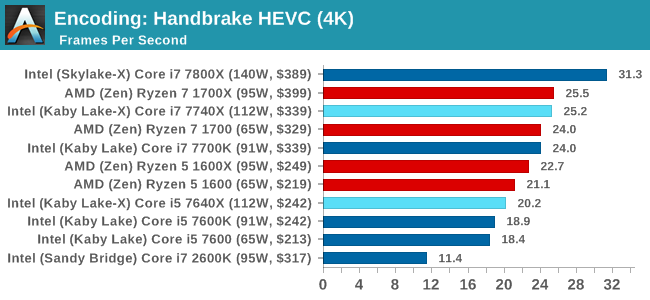










176 Comments
View All Comments
iwod - Monday, July 24, 2017 - link
Intel has 10nm and 7nm by 2020 / 2021. Core Count is basically a solved problem, limited only by price.What we need is a substantial breakthrough in single thread performance. May be there are new material that could bring us 10+Ghz. But those aren't even on the 5 years roadmap.
mapesdhs - Monday, July 24, 2017 - link
That's more down to better sw tech, which alas lags way behind. It needs skills that are largely not taught in current educational establishments.wolfemane - Monday, July 24, 2017 - link
Under Handbrake testing, just above the first graph you state:"Low Quality/Resolution H264: He we transcode a 640x266 H264 rip of a 2 hour film, and change the encoding from Main profile to High profile, using the very-fast preset."
I think you mean to say "HERE we transcode..."
Great article overall. Thank you!
Ian Cutress - Monday, July 24, 2017 - link
Thanks, corrected :)wolfemane - Monday, July 24, 2017 - link
I wish your team would finally add in an edit button to comments! :)On the last graph ENCODING: Handbrake HEVC (4k) you don't list the 1800x, but it is present in the previous two graphs @ LQ and HQ. Was there an issue with the 1800x preventing 4k testing? Quite interested in it's results if you have them.
Ian Cutress - Monday, July 24, 2017 - link
When I first did the HEVC testing for the Ryzen 7 review, there was a slight issue in it running and halfway through I had to change the script because the automation sometimes dropped a result (like the 1800X which I didn't notice until I was 2-3 CPUs down the line). I need to put the 1800X back on anyway for AGESA 1006, which will be in an upcoming article.IanHagen - Monday, July 24, 2017 - link
One thing that caught my eye for a while is how compile tests using GCC or clang show much better results on Ryzen compared to using Microsoft's VS compiler. Phoronix tests clearly shows that. Thus, I cannot really believe yet on Ian's recurring explanation of Ryzen suffering from its victim L3 cache. After all, the 1800X beats the 7700K by a sizable margin when compiling the Linux kernel.Isn't Ryzen relatively poor performance compiling Chromium due to idiosyncrasies of the VS compiler?
Ian Cutress - Monday, July 24, 2017 - link
The VS compiler seems to love L3 cache, then. The 1800X does have 2x threads and 2x cores over the 7700K, accounting for the difference. We saw a -17% drop going from SKL-S with its fully inclusive L3 to SKL-SP with a victim L3, clock for clock.Chromium was the best candidate for a scripted, consistent compile workflow I could roll into our new suite (and runs on Windows). Always open for suggestions that come with an ELI5.
ddriver - Monday, July 24, 2017 - link
So we are married to chromium, because it only compiles with msvc on windows?Or maybe because it is a shitty implementation that for some reason stacks well with intel's offerings?
Pardon my ignorance, I've only been a multi-platform software developer for 8 years, but people who compile stuff a lot usually don't compile chromium all day.
I'd say go GCC or Clang, because those are quality community drive open source compilers that target a variety of platforms, unlike msvc. I mean if you really want to illustrate the usefulness of CPUs for software developers, which at this point is rather doubtful...
Ian Cutress - Monday, July 24, 2017 - link
Again, find me something I can rope into my benchmark suite with an ELI5 guide and I try and find time to look into it. The Chromium test took the best part of 2-3 days to get in a position where it was scripted and repeatable and fit with our workflow - any other options I examined weren't even close. I'm not a computer programmer by day either, hence the ELI5 - just years old knowledge of using Commodore BASIC, batch files, and some C/C++/CUDA in VS.